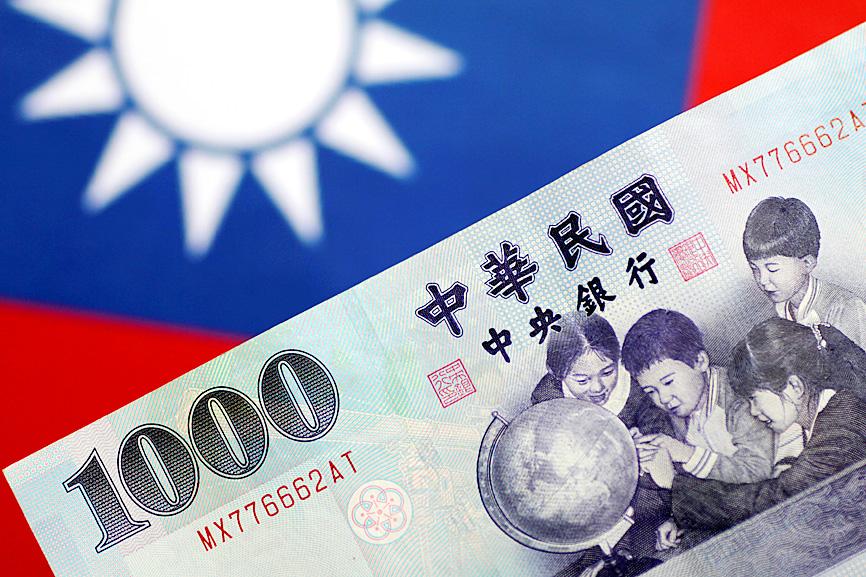The nation’s capital momentum remains healthy, as an upward trend in annual money supply growth continued last month, boosting the New Taiwan dollar and local capital markets, Yuanta Securities Investment Consulting Co (元大投顧) said in a research note on Friday.
Yuanta’s forecast came as the central bank released the latest money supply data a day earlier, showing that M1B — a narrow measurement of money supply in circulation, including currency and passbook savings deposits — rose 14.3 percent last month from a year earlier, higher than the 12.85 percent growth posted in October.
It was the fifth consecutive month that M1B growth had increased by a double-digit percentage, with the 14.3 percent rise marking the highest increase since May 2010, central bank data showed.

Photo: Reuters
The broader M2 monetary aggregate — which includes M1B, time deposits, foreign currency deposits and mutual funds — increased 7.6 percent year-on-year last month, compared with 7.05 percent growth posted the previous month.
Last month’s growth was the highest increase since September 2009, the data showed.
The central bank attributed the M1B and M2 growth to net capital inflows, faster growth in bank loans and investments.
The strong annual increase in M1B last month came as “outstanding securities transfer deposits climbed to a record high of NT$2.63 trillion [US$92.15 billion], which accelerated the growth in passbook savings deposits and indicated sufficient funds that people have at hand,” Yuanta economist Yen Chen-hui (顏承暉) said in the note.
The change in outstanding securities transfer deposits reflects individual investors’ sentiment. When deposits increase, it indicates that investors have a greater intention to buy stocks and the TAIEX might rise.
The TAIEX last month rose 1,176 points, or 9.38 percent, Taiwan Stock Exchange data showed.
“The high growth rate of M2 last month was mainly due to net capital inflow, net purchase of local securities by foreign investors and faster growth in NT dollar deposits by foreigners, as well as growth in lending and investments,” Yen said.
As Taiwan’s COVID-19 situation is relatively stable, the economy is growing and consumer prices have increased slightly, Yen said.
Coupled with the abundant market capital momentum, the central bank might keep its policy rates unchanged in the near term, which would support the strength of NT dollar exchange rate, he added.
The aggregate money supply is also expected to maintain growth on the back of healthy economic fundamentals and continued capital inflows, he said.
For the first 11 months of this year, the average annual growth rate of M1B was 9.79 percent and that of M2 was 5.6 percent, which stayed at the high end of the central bank’s target zone of 2.5 to 6.5 percent, central bank data showed.

Taiwan’s rapidly aging population is fueling a sharp increase in homes occupied solely by elderly people, a trend that is reshaping the nation’s housing market and social fabric, real-estate brokers said yesterday. About 850,000 residences were occupied by elderly people in the first quarter, including 655,000 that housed only one resident, the Ministry of the Interior said. The figures have nearly doubled from a decade earlier, Great Home Realty Co (大家房屋) said, as people aged 65 and older now make up 20.8 percent of the population. “The so-called silver tsunami represents more than just a demographic shift — it could fundamentally redefine the

The US government on Wednesday sanctioned more than two dozen companies in China, Turkey and the United Arab Emirates, including offshoots of a US chip firm, accusing the businesses of providing illicit support to Iran’s military or proxies. The US Department of Commerce included two subsidiaries of US-based chip distributor Arrow Electronics Inc (艾睿電子) on its so-called entity list published on the federal register for facilitating purchases by Iran’s proxies of US tech. Arrow spokesman John Hourigan said that the subsidiaries have been operating in full compliance with US export control regulations and his company is discussing with the US Bureau of

Businesses across the global semiconductor supply chain are bracing themselves for disruptions from an escalating trade war, after China imposed curbs on rare earth mineral exports and the US responded with additional tariffs and restrictions on software sales to the Asian nation. China’s restrictions, the most targeted move yet to limit supplies of rare earth materials, represent the first major attempt by Beijing to exercise long-arm jurisdiction over foreign companies to target the semiconductor industry, threatening to stall the chips powering the artificial intelligence (AI) boom. They prompted US President Donald Trump on Friday to announce that he would impose an additional

China Airlines Ltd (CAL, 中華航空) said it expects peak season effects in the fourth quarter to continue to boost demand for passenger flights and cargo services, after reporting its second-highest-ever September sales on Monday. The carrier said it posted NT$15.88 billion (US$517 million) in consolidated sales last month, trailing only September last year’s NT$16.01 billion. Last month, CAL generated NT$8.77 billion from its passenger flights and NT$5.37 billion from cargo services, it said. In the first nine months of this year, the carrier posted NT$154.93 billion in cumulative sales, up 2.62 percent from a year earlier, marking the second-highest level for the January-September